출처: Brian Leiter 블로그
Where to go for PhD studies focused on Nietzsche, 2023 edition
The recommendations are premised on three assumptions about what is needed to do good PhD work on Nietzsche: (1) a strong, general philosophical education; (2) one or more serious Nietzsche scholars to supervise the work; and (3) a philosophical environment in which one can get a solid grounding in the history of philosophy, especially ancient philosophy, Kant, and post-Kantian German philosophy.
Unfortunately, there are fewer viable choices now than in the past. Here's the five programs I'd strongly recommend for someone certain they plan to focus on Nietzsche:
Brown University: a strong department overall (still top 20ish in the US), with one leading Nietzsche specialist, Bernard Reginster; unfortunately, two other senior faculty with sympathetic and complementary interests (Paul Guyer and Charles Larmore) have both retired. So Reginster is "more on his own" than before, but the department is still worth considering given Reginster's presence.
New York University: the best department in the Anglophone world, with three senior faculty with interests in Nietzsche: Robert Hopkins, John Richardson, and Tamsin Shaw (though only Richardson has worked on Nietzsche in recent years, and even these days he is focused on other topics). The department now also has strong coverage of ancient philosophy and through Richardson and Anja Jauernig solid coverage of Kant and the post-Kantian Continental traditions. Given the department's dominant strengths in other areas to date (e.g., metaphysics, philosophy of mind), so far there have been hardly any students there working on Nietzsche, and only a handful working on other post-Kantian figures--something a prospective student should investigate.
Oxford University: a very strong faculty (top 2-3 in the Anglophone world), with strong coverage of the history of philosophy, with one significant senior Nietzsche scholar (Peter Kail) and one strong younger Nietzsche specialist (Alexander Prescott-Couch). Stephen Mulhall, Joseph Schear and Mark Wrathall offer good coverage of other aspects of the post-Kantian Continental traditions, especially Heidegger and phenomenology. Also outstanding in ancient philosophy.
University of Chicago: a strong, if somewhat idiosyncratic, department (top 20ish in the US), with particular strengths in ancient Greek and Roman philosophy and in Kant and post-Kantian German philosophy. Chicago has to have more scholars interested in Nietzsche from more divergent points of view than anywhere else: besides me, also James Conant, Martha Nussbaum, Robert Pippin, David Wellbery, and (part-time still) Michael Forster. There tend to be a lot of graduate students interested in Nietzsche (six of the ten Chicago PhD students I've worked closely with over the last decade have had serious Nietzsche interests, two have published on Nietzsche, and another wrote a dissertation with a significant Nietzsche component). (Note: All of Pippin's supervision in German philosophy in recent years has been of students working on Kant or Hegel, and he is no longer supervising PhD students in the philosophy department.)
University of Warwick: a good department overall (top 10ish in the UK), with one well-known Nietzsche scholar (Andrew Huddleston) and one junior scholar working on Nietzsche (Timothy Stoll), plus strong coverage generally of Kant and the post-Kantian Continental traditions (e.g., Quassim Cassam, Stephen Houlgate).
Here are some other departments a student interested in Nietzsche might consider as well, although they are not as strong as the preceding in my judgment:
Boston University: a solid department (top 50ish in the US), with a strong commitment to the history of philosophy, including Kant and the post-Kantian Continental traditions (e.g., Daniel Dahlstrom, Sally Sedgwick). BU has one well-known Nietzsche specialist (Paul Katsafanas, though he is pushing a rather distinctive, and to my mind, implausible line about Nietzsche these days, though I still highly commend several of his earlier papers that we've discussed on this blog in the past--but students sympatico to his approach would no doubt find him an excellent person with whom to work).
Stanford University: a strong department (top 15 in the US), with two senior faculty who have done important work on Nietzsche: Lanier Anderson and Nadeem Hussain. In the past, I would have put Stanford in the top group, but Nadeem tells me he's not really working much on Nietzsche anymore. Also strong in ancient philosophy and, with Anderson and Michael Friedman, also very good for Kant. The department's center of gravity, judging from its PhD graduates, does appear to be more in logic, language, mind, metaphysics and epistemology.
University of California, Riverside: a solid department overall (top 30 in the US) and traditionally one of the best places in the U.S. to study the Continental traditions in philosophy with two important senior faculty--Maudemarie Clark (a leading Nietzsche specialist) and Pierre Keller (Kant, German Idealism, phenomenology)--as well as the recently tenured Sasha Newton (Kant, German Idealism) and Georgia Warnke (Critical Theory) in Political Science. The department is especially notable for the way in which the study of the Continental traditions is closely integrated with the study of the rest of philosophy, to the enrichment of both. (It's also a very collegial place, one of my favorite departments to visit in the country.) There is also a large and impressive group of graduate students working on the post-Kantian traditions and/or interested in Nietzsche. The problem now is that Clark will soon retire, and it's unclear whether the department will appoint another Nietzsche specialist.
University College London: a good department (top 10 in the UK), with two faculty who publish on Nietzsche: Sebastian Gardner and Tom Stern. Gardner is a major scholar of Kant and German Idealism. Gardner is excellent, Stern's work is weak.
University of Essex: a narrow department, but strongly focused on Kant and the post-Kantian Continental traditions. One well-known Nietzsche specialist on faculty: Beatrice Han-Pile.
University of Southampton: A solid but not top 15 UK department, with a particular strength in Schopenhauer and Nietzsche--most notably Christopher Janaway, but others in philosophy or cognate units include David Owen and Aaron Ridley.
Yale University: Robert Gooding-Williams is moving from Columbia to Yale, and he continues to be interested in Nietzsche, although much of his published work is on philosophy of race in recent years. The Department is strong in 19th-century German philosophy (Paul Franks, Jake McNulty), and also outstanding in the history of ancient Greek and Roman philosophy and modern philosophy.
For a student looking to do a terminal M.A. first, s/he might consider any of the UK departments (where students first do a master's degree or B.Phil. before doing the PhD), or, in the U.S., Georgia State University remains far and away the best choice: in addition to solid coverage of moral, political and legal philosophy, ancient philosophy, and philosophy of mind and cognitive science, the department has two well-known scholars who work on Nietzsche (Jessica Berry and Gregory Moore), and two other faculty who work on Kant and post-Kantian German philosophy (Sebastian Rand and Eric Wilson).
The best Nietzsche scholar on the European Continent is Mattia Riccardi, now at the University of Porto in Portugal. Also in Portugal, The New University of Lisbon continues to have a lively philosophical community interested in Nietzsche led by Joao Constancio. Andreas Urs Summer at the University of Freiburg in Germany is doing interesting historical and philological work, albeit of somewhat less clear philosophical import.

